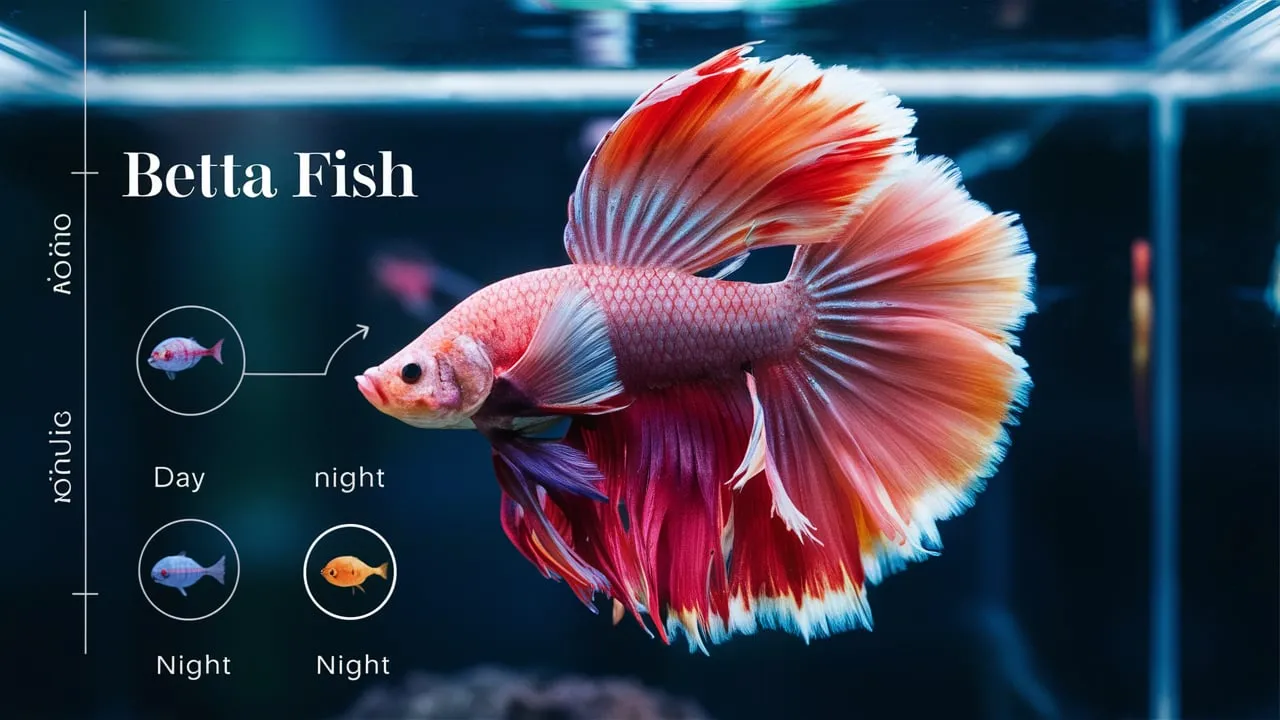Are Betta Fish Nocturnal? Many aquarists are curious about their sleep patterns, especially whether they are nocturnal. This Betta Fish Guide will delve into the fascinating world of Betta fish sleep, exploring their activity levels, sleep cycles, and the factors that influence their behavior.
Understanding Betta Fish Biology
Before delving into the nocturnal nature of betta fish, it’s essential to understand their biological makeup and natural habitat.
Natural Habitat and Behavior
Betta fish (Betta splendens) originate from the shallow, slow-moving waters of Southeast Asia, including countries like Thailand, Cambodia, and Vietnam. In their natural environment, they inhabit:
- Rice paddies
- Slow-moving streams
- Stagnant ponds
These environments typically feature:
- Dense vegetation
- Low light conditions
- Varying oxygen levels
Understanding this natural habitat provides crucial insights into betta fish behavior, including their sleep patterns.
Betta Fish Anatomy
Betta fish possess several unique anatomical features that influence their behavior and sleep patterns:
- Labyrinth organ: This specialized organ allows bettas to breathe air from the surface, adapting them to low-oxygen environments.
- Lateral line: A sensory organ that helps detect movement and vibrations in the water.
Well-developed eyes: Bettas have good vision, which plays a role in their activity patterns.
Are Betta Fish Nocturnal?
The short answer to whether betta fish are nocturnal is: not exactly. Betta fish are neither strictly nocturnal nor diurnal. Instead, they exhibit a behavior pattern known as crepuscular activity.
What Does Crepuscular Mean?
Crepuscular animals are most active during twilight hours – dawn and dusk. This behavior is common among many fish species and is an adaptation to:
- Avoid predators
- Take advantage of prey availability
- Cope with temperature fluctuations
For betta fish, this crepuscular nature means they tend to be most active during the early morning and late evening hours.

Betta Fish Sleep Patterns
Understanding betta fish sleep patterns is crucial for proper care and tank setup. While they don’t sleep in the same way humans do, bettas do rest and have periods of reduced activity.
How Betta Fish Sleep
Betta fish sleep in unique ways:
- Floating or resting on plant leaves
- Hovering near the water surface
- Finding a cozy spot in decorations or at the bottom of the tank
During these rest periods, you may notice:
- Slowed gill movements
- Faded colors
- Minimal fin movement
Duration of Betta Fish Sleep
Betta fish don’t have a continuous sleep cycle like humans. Instead, they take short “naps” throughout the day and night. On average, a betta fish might sleep for:
- 8-12 hours total in a 24-hour period
- Broken into multiple short rest sessions
Factors Affecting Betta Fish Sleep Patterns
Several factors can influence when and how betta fish sleep:
Light Exposure
Light plays a crucial role in regulating betta fish behavior:
- Natural light cycles help maintain their circadian rhythm
- Excessive light can stress bettas and disrupt sleep
- Too little light can lead to lethargy and color fading
Tank Environment
The aquarium setup significantly impacts betta sleep patterns:
- Proper hiding spots provide security for rest
- Adequate swimming space allows for natural behavior
- Water parameters (temperature, pH, etc.) affect overall health and activity levels
Diet and Feeding Schedule
Proper nutrition and feeding times can influence betta activity:
- Regular feeding schedules can help establish routine
- Overfeeding can lead to lethargy and health issues
- Underfeeding may cause stress and increased activity in search of food
Tank Mates and Stress Levels
The presence of other fish or stressors can affect betta sleep:
- Aggressive tank mates may prevent proper rest
- Overcrowding can lead to stress and disrupted sleep patterns
- Sudden changes in the environment can cause temporary sleep disturbances

Creating an Ideal Sleep Environment for Betta Fish
To ensure your betta fish gets adequate rest and maintains a healthy sleep pattern, consider the following tips:
Lighting Schedule
Establish a consistent lighting schedule:
- 8-12 hours of light per day
- Use a timer to maintain consistency
- Gradually transition between light and dark periods
Tank Setup
Design a betta-friendly aquarium:
- Provide plenty of hiding spots (plants, caves, decorations)
- Ensure adequate swimming space (minimum 5-gallon tank)
- Maintain stable water parameters
Feeding Routine
Develop a regular feeding schedule:
- Feed 2-3 times daily in small portions
- Avoid feeding right before “bedtime”
- Remove uneaten food to prevent water quality issues
Minimize Disturbances
Create a calm environment:
- Place the tank in a quiet area of your home
- Avoid sudden movements or loud noises near the tank
- Consider using a background to reduce external stimuli
Conclusion
While betta fish aren’t strictly nocturnal, their crepuscular nature and unique sleep patterns require special consideration from aquarium enthusiasts. By understanding and catering to these needs, you can create an environment that promotes natural behavior, reduces stress, and enhances the overall health and longevity of your betta fish.
Remember, every betta fish is an individual with its own personality and habits. Observe your fish closely, make adjustments as needed, and enjoy the fascinating world of betta fish care.

Related Posts
Shrimp Tank Mates: Choosing The Right Companions
Are Fish Omnivores? A Look at Fish Feeding Habits
The Most Expensive Betta Fish: A Guide To Rare & Varieties